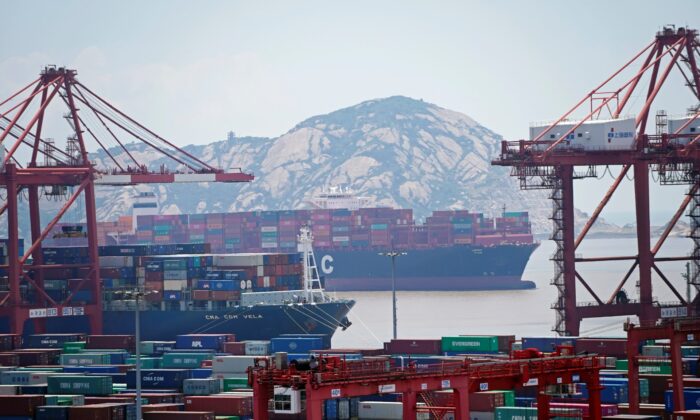Trump: US Should Get ‘Substantial Portion’ of TikTok Operations Sale Price
BEIJING/SINGAPORE—China bought only 5 percent of the targeted $25.3 billion in energy products from the United States in the first half of 2020, falling well short of its trade deal commitments at a time when relations between the two top economies are already sour.
China’s imports of crude oil, liquefied natural gas (LNG), metallurgical coal, and other energy products totaled around $1.29 billion this year through June, according to Reuters calculations based on China customs data.
While Chinese purchases of U.S. products accelerated recently, analysts say weak energy prices and worsening relations means Beijing may undershoot its full-year goal in the Phase 1 deal agreed in January.
“China is unlikely to fulfill its Phase 1 commitments as they were overly ambitious to begin with,” said Michal Meidan, a director at the Oxford Institute for Energy Studies.
Failure to meet the target could further strain U.S.-China relations, which have nosedived since the outbreak of the coronavirus.
 A maze of crude oil pipes and valves pictured during a tour by the Department of Energy at the Strategic Petroleum Reserve in Freeport, Texas, on June 9, 2016. (Richard Carson/Reuters)
A maze of crude oil pipes and valves pictured during a tour by the Department of Energy at the Strategic Petroleum Reserve in Freeport, Texas, on June 9, 2016. (Richard Carson/Reuters)Crude Oil
U.S. crude oil had been expected to feature prominently in China’s Phase 1 purchases. But a surge in freight rates coupled with a collapse in fuel demand, as the coronavirus spread, made U.S. imports relatively costly for refiners in China.
China imported only 45,603 barrels per day (bpd) of U.S. oil in the first half of 2020 compared with 85,453 bpd in the same period in 2019.
Sushant Gupta, research director at consultancy firm Wood Mackenzie, said that to meet the trade deal target, China would need to import 1.5 million bpd of U.S. crude in 2020 and 2021, revising that estimate up from nearly 1 million bpd previously as low oil prices reduced the value of crude purchases.
China’s refiners boosted U.S. purchases after flagship oil grades slumped into negative territory in April.
China imported roughly 940,000 bpd of U.S. crude in July, and is expected to average 1.01 million bpd in August, an all-time high, said Refinitiv analyst Emma Li.
But narrowing refining margins and swelling stockpiles are expected to slow the import pace in the third quarter.
LNG & Coal
China more than trebled its LNG import volumes from the United States in the first half of 2020 compared to 2019, to 878,754 tons.
However, due to lower prices the value of those purchases only doubled, underscoring the challenge of racking up high value trade deal goals while energy prices are weak.
A similar problem is afflicting U.S. exports of metallurgical coal, which have already struggled to compete internationally in recent years.
“The political risks and great uncertainties are hampering China’s long-term oil and gas purchases,” said Li Yao, CEO of Beijing-based consultancy SIA Energy.
By Muyu Xu and Chen Aizhu
Focus News: China Only Fulfills 5 Percent of Sino-US Energy Trade Deal in First Half of 2020
EU Expresses Concern Over Hong Kong’s Election Delay, Candidate Disqualifications
